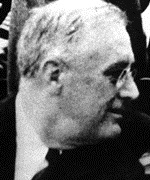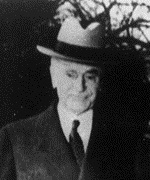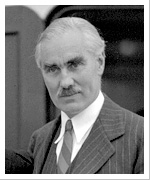 |
|
|
|
|
 |
|
|
 |
|
|
|
|
|
|
 |
 |
 |
| Franklin Roosevelt | Cordel Hull | Joseph Grew |
 |

Provided by "Mainichi Newspapers"
|
 |
Franklin Roosevelt
January 30, 1882–April 12, 1945
U.S politician and President of the United States of America at the time of negotiations between Japan and the U.S. Roosevelt became a senator from the state of New York after graduation from Harvard University in 1910 and took an active part in the 1912 presidential election by supporting Wilson of the Democratic Party. When Wilson was elected president, Roosevelt held the position of Vice Minister of the Navy (until 1920), and was active in this position during World War I. During the next summer, he resigned as Undersecretary of the Navy as he suffered from polio, which he fought continuously. Nevertheless, Roosevelt acceded to the office of New York Governor (he held the office until 1933) and in 1932, won the presidential election, becoming the 32nd President of the United States in March of 1933 (until 1945). After becoming president, he created the New Deal, based on the three R’s (Recovery, Relief, and Reform) as its axis, and developed an economic revitalization policy after the global financial crisis. With respect to East Asian policy, Roosevelt continued giving notice of the abrogation of the Treaty of Commerce and Navigation between the United States and Japan in 1939 because of the expansion of the Sino–Japanese War, and strengthened support to the Chongqing Nationalist government. In 1940, in response to the Japanese army's stationing in North French Indochina and the formation of the Tripartite Pact, Roosevelt strengthened steps towards economic sanctions against Japan. In addition, during 1941, while negotiations between Japan and the U.S. pushed forward, Roosevelt froze Japanese assets on the stationing of Japanese forces in the southern part of French Indochina in July. Later, Japan and the United States entered into war with the Japanese army’s attack on Pearl Harbor on December 8. |
|
 |
 |
 |

Provided by "Mainichi Newspapers"
|
 |
Cordell Hull
October 2, 1871–July 23, 1955
U.S politician and U.S. Secretary of State at the time of negotiations between Japan and the U.S. After graduating from Cumberland University, he passed through legal circles and the state legislature, and became a member of the Lower House (State of Tennessee, Democratic Party). After being elected a member of the Upper House in 1931, and after Franklin Roosevelttook office as President on March 4, Hull resigned from the Upper House to become Secretary of State (in charge of diplomacy), an office he held until November 30, 1944. Hull was familiar with economic issues (particularly tax laws) and during the early days of his term of office, he attended at world economy meeting in London and enacted a reciprocal benefit trade treaty among eighteen countries, which took about four years. The purpose of this agreement was to extend commerce of the countries as much as possible by adopting low tariff rates among treaty powers. In addition, Hull pushed forward a good neighbor policy for Latin American countries in cooperation with the President and approved by the Soviet Union in the autumn of 1933, and developed a foundation for diplomatic relations between the U.S. and the Soviet Union. In 1941, he attended a conference with Ambassador to the U.S. Nomura as the person in charge of foreign policy. On November 26 of the same year, Hull distributed the “Hull Note,” which showed refusal for a compromise solution (Drafts A and B」) from Japan, to Ambassador Nomura and Ambassador Extraordinary and Plenipotentiary Kurusu. On November 30, 1944, Hull resigned as Secretary of State because of failing health. He was praised for his success by being appointed as the U.S. representative at a conference in San Francisco that determined the creation of the United Nations. The following year, Hull won the Nobel Peace Prize. |
|
 |
 |
 |

Provided by "Mainichi Newspaper"
|
 |
Joseph Grew
May 27, 1880–May 25, 1965
U.S. diplomat and U.S. Ambassador to Japan at the time of negotiations between Japan and the U.S. Grew was born to a distinguished family in Boston. After graduating from the prestigious Groton School in Boston, he went on to graduate from Harvard University in 1902. As a diplomat, appointed to start as a consulate general attaché in Cairo in 1904, he resided in Mexico City, St. Petersburg, Berlin, and Vienna. At the outbreak of World War I, Grew acted as counselor, then Charges d'affaires at the Embassy in Germany, and after the U.S. participation in the war was over, Grew worked as a representative manager in a Western Europe division in the Ministry of National Defense, and also as U.S. Secretary Plenipotentiary at a Paris peace conference. He was successively minister in Denmark and Switzerland and became a U.S. representative at the Lausanne compensation meeting in 1932. From 1924 to 1927, Grew acted as Undersecretary of the State and contributed to reforming the diplomatic system and conversion of special occupation territories. Later, Grew became Ambassador to Turkey then arrived in Japan as Ambassador Extraordinary and Plenipotentiary in 1932 (until 1941). Grew is known as a Japanophile of the U.S during the period before the World War. In July 1939, even after renunciation of the Treaty of Commerce and Navigation between the United States and Japan, he suggested to the U.S. State Department to make temporary arrangements to prevent the souring of U.S.–Japanese relations. |
|
|
|
 |
 |
|
 |
|
 |
|
 |
All Rights Reserved,Copyright Japan Center for Asian Historical Records 2005. |
 |
|
|
|